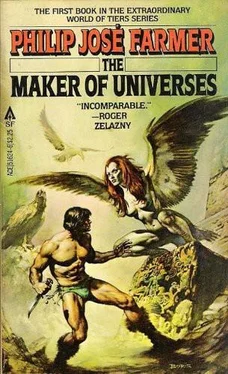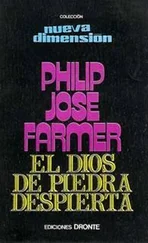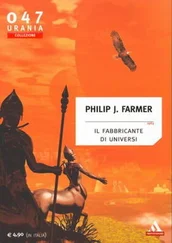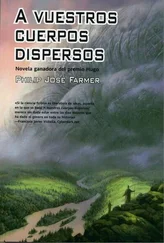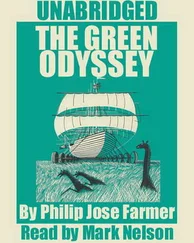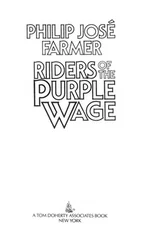“I got it from a man who called himself Kickaha. You saw him. Do you know him?”
The girl’s huge eyes were dark green; he thought them the most beautiful he had ever seen. This despite, or maybe because of, the catlike pupils.
She shook her head. “No. I did not know him. I first saw him when those”—she swallowed and turned pale and looked as if she were going to vomit—“things chased him to the boulder. And I saw them drag him off the boulder and take him away.”
“Then he wasn’t ended?” Wolff asked. He did not say killed or slain or dead, for these were taboo words.
“No. Perhaps those things meant to do something even worse than… ending him?”
“Why run from me?” Wolff said. “I am not one of those things.”
“I… I can’t talk about it.”
Wolff considered her reluctance to speak of unpleasantness. These people had so few repulsive or dangerous phenomena in their lives, yet they could not face even these. They were overly conditioned to the easy and the beautiful.
“I don’t care whether or not you want to talk about it.” he said. “You must. It’s very important.”
She turned her face away. “I won’t.”
“Which way did they go?”
“Who?”
“Those monsters. And Kickaha.”
“I heard him call them gworl,” she said. “I never heard that word before. They… the gworl. . . must come from somewhere else.” She pointed seawards and up. “They must come from the mountain. Up there, somewhere.”
Suddenly she turned to him and came close to him. Her huge eyes were raised to his, and even at this moment he could not help thinking how exquisite her features were and how smooth and creamy her skin was.
“Let’s get away from here!” she cried. “Far away! Those things are still here. Some of them may have taken Kickaha away, but all of them didn’t leave! I saw a couple a few days ago. They were hiding in the hollow of a tree. Their eyes shone like those of animals, and they have a horrible odor, like rotten fungus-covered fruit!”
She put her hand on the horn. “1 think they want this!”
Wolff said, “And I blew the horn. If they’re anywhere near, they must have heard it!”
He looked around through the trees. Something glittered behind a bush about a hundred yards away.
He kept his eyes on the bush, and presently he saw the bush tremble and the flash of sunlight again. He took the girl’s slender hand in his and said, “Let’s get going. But walk as if we’d seen nothing. Be nonchalant.”
She pulled back on his hand and said, “What’s wrong?”
“Don’t get hysterical. I think I saw something behind a bush. It might be nothing, then again it could be the gworl. Don’t look over there! You’ll give us away!”
He spoke too late, for she had jerked her head around. She gasped and moved close to him. “They… they!”
He looked in the direction of her pointing finger and saw two dark, squat figures shamble from behind the bush. Each carried a long, wide, curved blade of steel in its hand. They waved the knives and shouted something in hoarse rasping voices. They wore no clothes over their dark furry bodies, but broad belts around their waists supported by scabbards from which protruded knife-handles.
Wolff said, “Don’t panic. I don’t think they can run very fast on those short bent legs. Where’s a good place to get away from them, someplace they can’t follow us?”
“Across the sea,” she said in a shaking voice. “I don’t think they could find us if we got far enough ahead of them. We can go on a histoikhthys.”
She was referring to one of the huge molluscs that abounded in the sea. These had bodies covered with paper-thin but tough shells shaped like a racing yacht’s hull. A slender but strong rod of cartilage projected vertically from the back of each, and a triangular sail of flesh, so thin it was transparent, grew from the cartilage mast. The angle of the sail was controlled by muscular movement, and the force of the wind on the sail, plus expulsion of a jet of water, enabled the creature to move slightly in a wind or a calm. The merpeople and the sentients who lived on the beach often hitched rides on these creatures, steering them by pressure on exposed nerve centers.
“You think the gworl will have to use a boat?” he said. “If so, they’ll be out of luck unless they make one. I’ve never seen any kind of sea craft here.”
Wolff looked behind him frequently. The gworl were coming at a faster pace, their bodies rolling like those of drunken sailors at every step. Wolff and the girl came to a stream which was about seventy feet broad and, at the deepest, rose to their waists. The water was cool but not chilling, clear, with slivery fish darting back and forth in it. When they reached the other side, they hid behind a large cornucopia tree. The girl urged him to continue, but he said, “They’ll be at a disadvantage when they’re in the middle of the stream.”
“What do you mean?” she asked.
He did not reply. After placing the horn behind the tree, he looked around until he found a stone. It was half the size of his head, round, and rough enough to be held firmly in his hand. He hefted one of the fallen cornucopias. Though huge, it was hollow and weighed no more than twenty pounds. By then, the two gworl were on the bank of the opposite side of the stream. It was then that he discovered a weakness of the hideous creatures. They walked back and forth along the bank, shook their knives in fury, and growled so loudly in their throaty language that he could hear them from his hiding place. Finally, one of them stuck a broad splayed foot in the water. He withdrew it almost immediately, shook it as a cat shakes a wet paw, and said something to the other gworl. That one rasped back, then screamed at him.
The gworl with the wet foot shouted back, but he stepped into the water and reluctantly waded through it. Wolff watched him and also noted that the other was going to hang back until the creature had passed the middle of the stream; then he picked up the cornucopia in one hand, the stone in the other, and ran toward the stream. Behind him, the girl screamed. Wolff cursed because it gave the gworl notice that he was coming.
The gworl paused, the water up to its waist, yelled at Wolff and brandished the knife. Wolff reserved his breath, for he did not want to waste his wind. He sped toward the edge of the water, while the gworl resumed his progress to the same bank. The gworl on the opposite edge had frozen at Wolff’s appearance; now he had plunged into the stream to help the other. This action fell in with Wolff’s plans. He only hoped that he could deal with the first before the second reached the middle.
The nearest gworl flipped his knife; Wolff lifted the cornucopia before him. The knife thudded into its thin but tough shell with a force that almost tore it from his grasp. The gworl began to draw another knife from its scabbard. Wolff did not stop to pull the first knife from the cornucopia; he kept on running. Just as the gworl raised the knife to slash at Wolff.
Wolff dropped the stone, lifted the great bell-shape high, and slammed it over the gworl.
A muffled squawk came from within the shell. The cornucopia tilted over, the gworl with it, and both began floating downstream. Wolff ran into the water, picked up the stone, and grabbed the gworl by one of its thrashing feet. He took a hurried glance at the other and saw it was raising its knife for a throw. Wolff grabbed the handle of the knife that was sticking in the shell, tore it out, and then threw himself down behind the shelter of the bell-shape. He was forced to release his hold on the gworl’s hairy foot, but he escaped the knife. It flew over the rim of the shell and buried itself to the hilt in the mud of the bank.
Читать дальше
